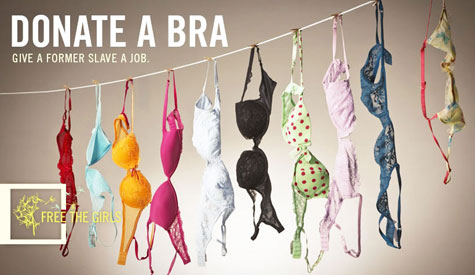Pastor collects women’s underwear--but for good reason
Bras are the hottest item in the second-hand clothing market. So David Terpstra, A former pastor at Next Level Church in Englewood, Colorado, uses them to provide jobs for sex trafficking survivors in Sub-Saharan Africa. His organization, "Free the Girls," collects thousands of bras from women in the United States, which are then sold to other women in Mozambique by the survivors. Here, he discusses why he chose bras and defends the sustainability of his model. RNS: What was the need you recognized among trafficking survivors?
DT: One of the most significant challenges I hear from those who work with survivors is the difficulty survivors have reentering the workforce. Their lives have been stolen from them. Usually taken as children, they were unable to finish school and have been through years of trauma. We have found that those who are most skilled with helping them to process through the trauma and get back on a track towards wholeness are not the same people with the skill sets to provide jobs and job training. That’s where we love to help.
RNS: Why bras?
DT: Bras work well for a number of reasons. From the sales standpoint, they are the hottest item in the second-hand clothing market. Bras fetch a higher price per kilogram than any other item of used clothing on the second-hand clothing market. Also, they are small and portable. Girls can carry them in their backpacks to school, they can drape them over their arms, or they can string them up along a clothesline. Best of all, only women buy them. Because the women with whom we work have been used and abused by men for so long, it is much safer for them to be selling to other women.
Bras also work well from a collection standpoint. We like to say that every woman in America has a graveyard in the back of her underwear drawer full of bras they don’t use, or never fit right in the first place. We take those bras and put them to good use.
RNS: Some American women describe the psychological “ick” factor of buying and wearing a used bra. Is this a factor in the communities you serve?
